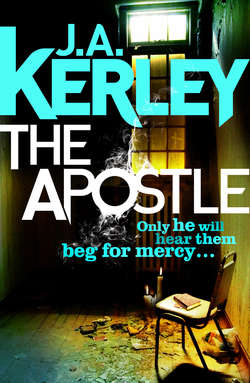Читать книгу The Apostle - J. Kerley A. - Страница 19
14
ОглавлениеThe FCLE comprised two floors in Miami’s towering downtown Clark Center. Though it was the hub of municipal government, I suspected the politically attuned and sporadically Machiavellian Roy McDermott was the reason our agency had been allocated such prime airspace. The admin and upper-level investigative and legal types occupied the twenty-third floor, with the one below the province of pool investigators, support, and record-keeping.
When Roy had moved Ziggy Gershwin from the tight back room of my office to his own space, he’d kept the kid on the twenty-third floor, claiming there was no room downstairs, but I knew it was because Roy figured Gershwin was a future star, proving himself in the cases we’d closed.
Gershwin’s office was small and windowless and down a long hall past the legal team. He was at his desk, tipped back in his chair and studying reports. We’d spent a lot of time together and he seemed to have adopted some of my traits, trading in the former skate-punk garb for summer-weight jackets over T-shirts and jeans, and wearing dark running shoes, which beat the hell out of hard soles on the occasions when you had to chase lowlifes down alleys and over fences.
He looked up and grinned. “S’up, Big Ryde?”
“I need a listing of sex offenders in a fifty-mile radius, Zigs, especially those recently released from prison. Got a couple trainees you can use?”
My worst fear was that the perp had settled an old score with Sandoval, but had more scores to settle. We needed to take this monster down fast.
“Uh, no problem.”
“You sound hesitant.”
“Just thinking who I can put on it. Roy’s got me on the Menendez case, kind of on the QT.”
“Menendez? Like what?”
“The lady’s a saint, right? So no one’s looking past that. Roy wanted me to take a tiptoe through her history.”
Meaning dig into Menendez deeper than others were doing, but leave a light footprint, if any. All cop agencies have biases toward their own, and it was best outsiders handle such things.
“Understood,” I said.
“But no problem with checking the pervs,” Gershwin assured me, picking up his phone. “I’ll put Wagner and Brazano on it. They’re new, but good.”
“Gracias, amigo.”
I was thinking about Menendez as I returned to my office. It was the worst type of case: a beloved and talented public figure killed for apparently no reason, knifed down in her prime in her own home, not a shred of evidence to be found. I was pitying every MDPD detective when my cell rang: Belafonte.
“Good morning,” I said, trying for jovial to balance out my dark musings on Menendez. “How’s my favorite MDPD liaison today?”
“She just heard about a body found in the waterway in Golden Glades,” Belafonte said quietly. “She’s hearing ‘wrapped in a burnt sheet’.”
So much for starting the day on a high note. With siren and flashers pushing aside traffic, I raced there in fifteen minutes, a retiree-oriented neighborhood shaded by palms and garnished with tropical foliage. The street was blocked by a white-and-green MDPD patrol car and I continued to a brick home fronted by another cruiser, an ambulance, and mobile units from the Medical Examiner’s office and the Forensics team. Anxious residents stood at the curb and beyond them I saw Belafonte beside the canal a hundred feet behind the house, part of a highway of water running from the glades to Biscayne Bay.
The body had been bobbing at the water’s edge, but was now ashore, a charred husk shaped like a mummy. Belafonte was talking to a distraught-looking elderly guy holding a Chihuahua to his breast. I figured he’d found the horror. The scene tech was a friend, Deb Clayton.
“This no place to leave a corpse, Carson,” Deb said. “The perp would have to cross the yard, set off a half-dozen yappy dogs. Seems more likely it was dumped upriver.”
I looked upstream and saw Dixie Highway bridging the canal, the traffic a line of fast metal. I heard the roar of heavy trucks and motorcycles. Belafonte saw where I was looking.
“Even at night, there’s a lot of traffic on Dixie. Better would be Ponce de Leon Boulevard, just past Dixie. Traffic’s lighter. But she could have been dumped anywhere above here.”
“Wonder what the flow rate is?” I said, studying the waves.
Belafonte bent to the water’s edge and found a sodden cigarette butt. She flipped it into the canal and watched it float lazily away.
“The water’s moving a quarter-mile an hour, give or take.”
“How’d you know that?”
“Bermuda’s a dot in the Atlantic. You get to know water. This close to the Bay there’d be a tide effect. Charts might help. I’ll make a few calls.”
“First we got a date at Missing Persons.”
The Missing Persons department at MDPD was overseen by Rod Figueroa. We’d had a rocky start a year ago, but he’d overcome some personal demons in the interim and was now a solid cop. Figueroa was tall and well-built, with long blond hair over an attractive but slightly lopsided face, the result of a jet-skiing accident when he was a teenager. He was also openly gay, another difference from last year.
I laid out our story. All we had on the body was an approximate height since, like Kylie Sandoval, the corpse was charred and covered with burned fabric. Figueroa opened a file and nodded as he flipped through pages.
“We had a woman in first thing this morning, Carson. Said her twenty-five-year-old daughter was supposed to pick up her kid a bit past four in the a.m.”
“Four a.m.?”
“The daughter does night stock at a Publix. When the daughter didn’t show up, Mama called the store. The night manager said the kid, Teresa Mailey, left on schedule. According to the mother, you could set your watch by the daughter.”
